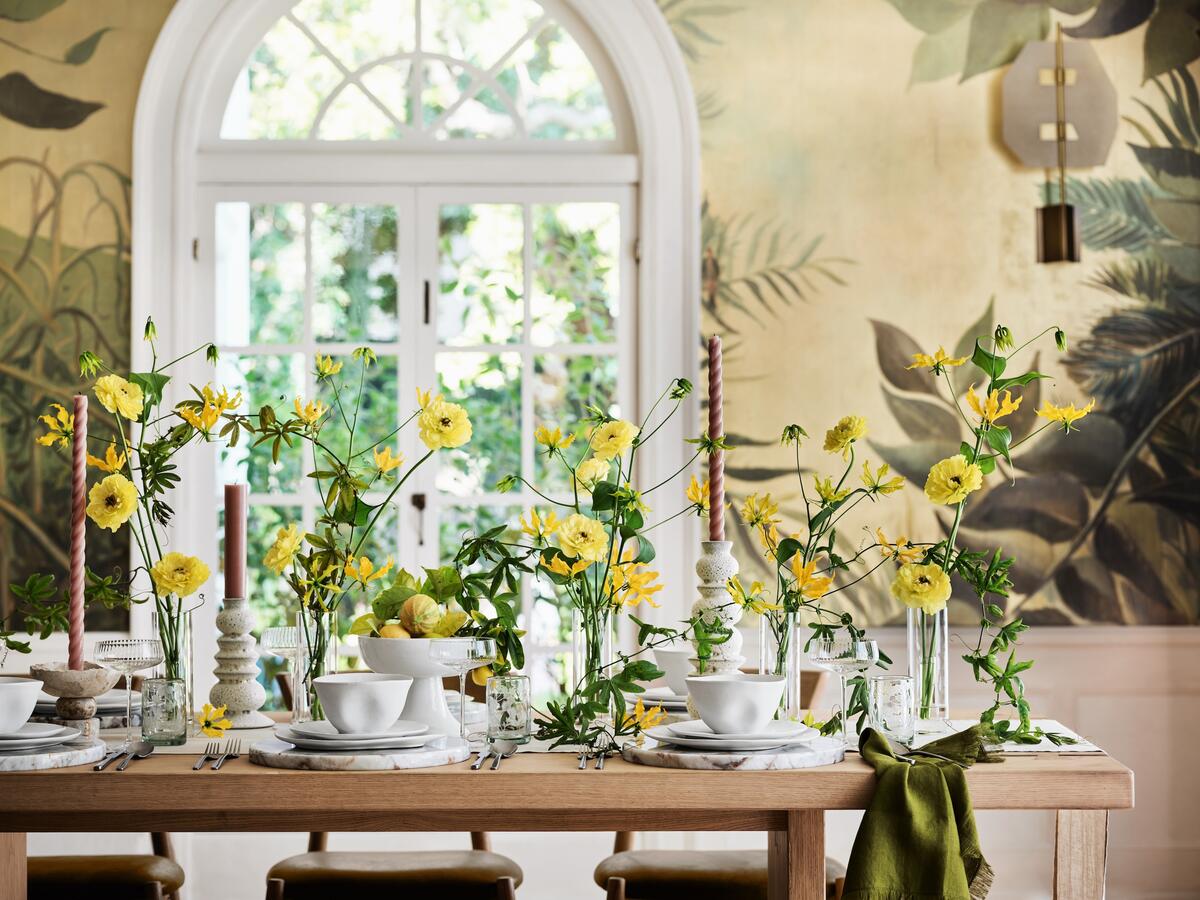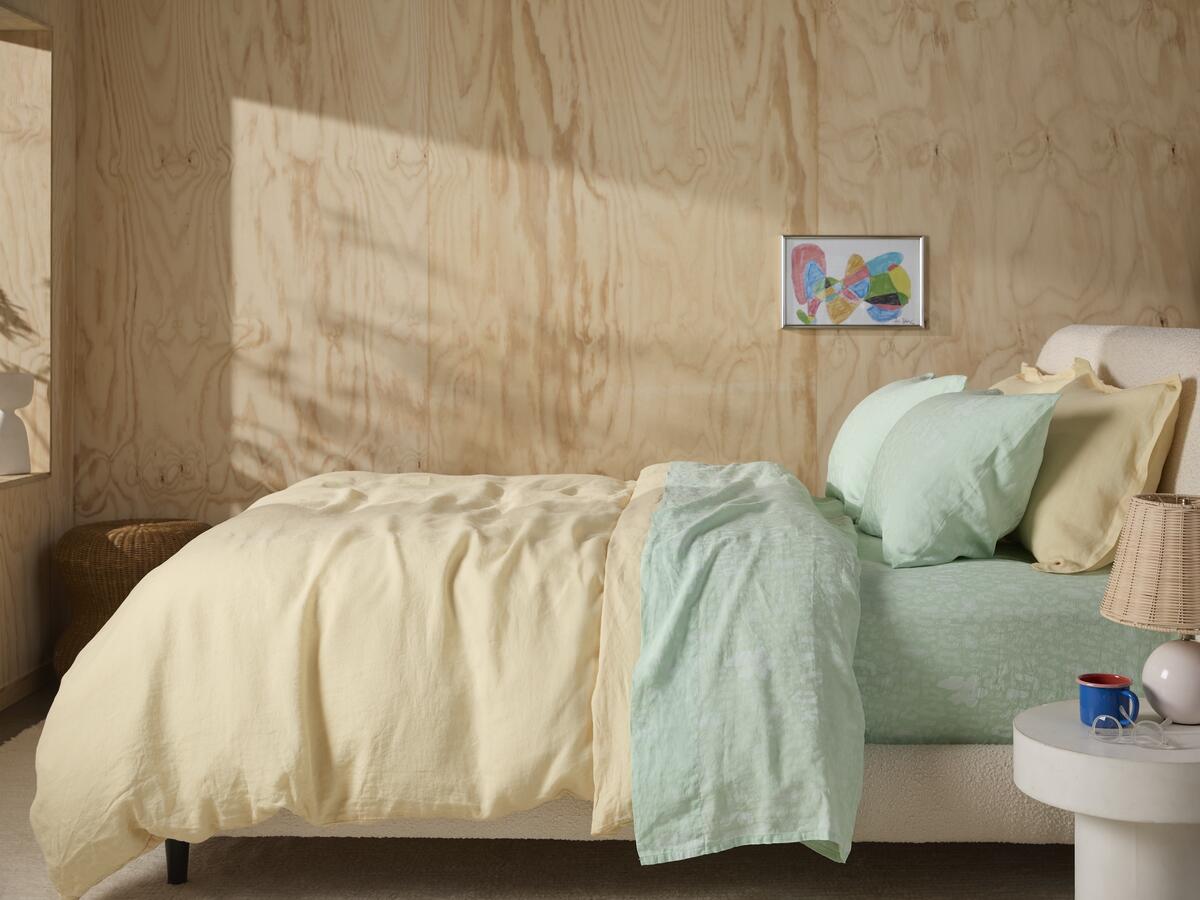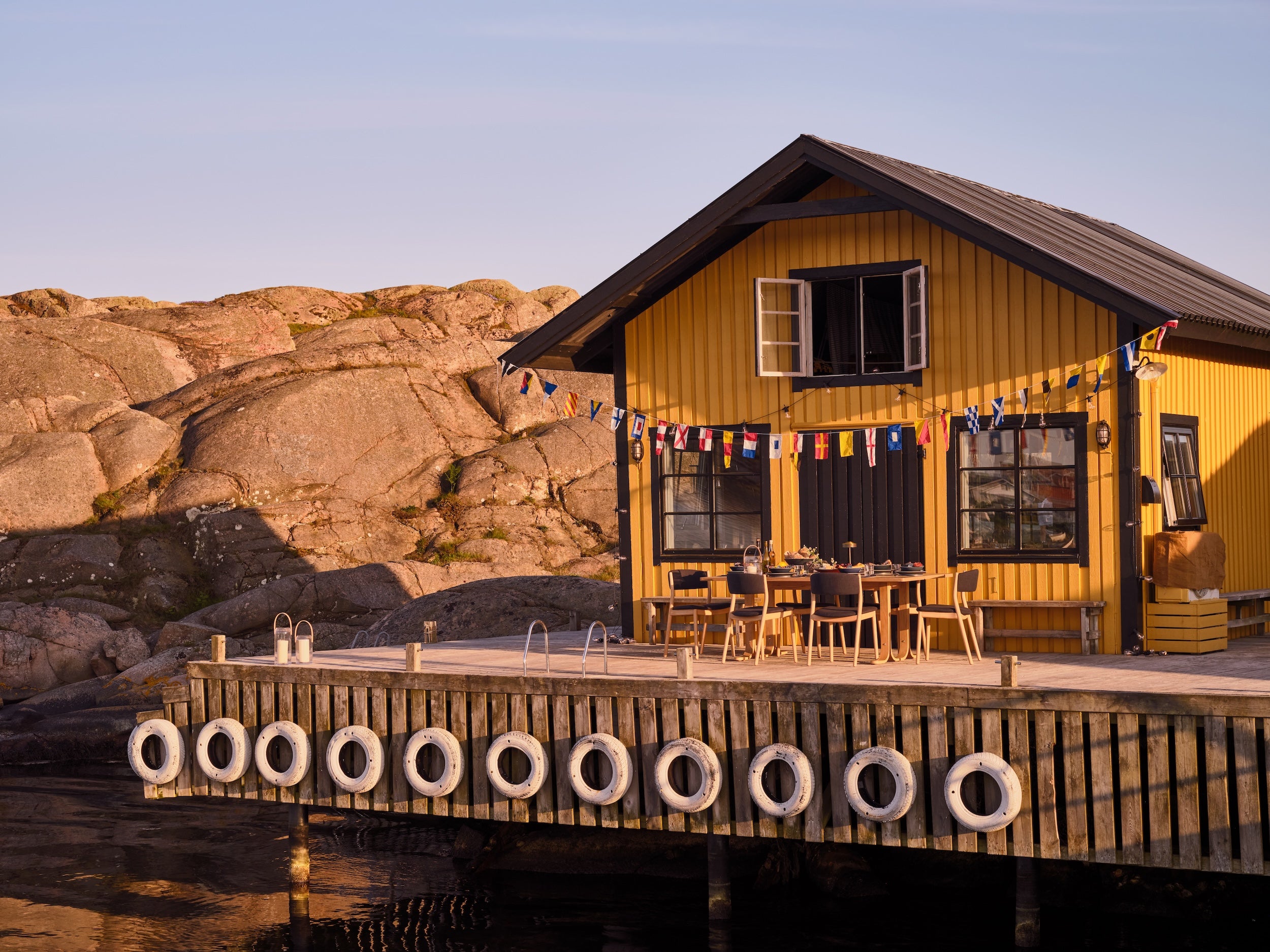A quick glance at the video campaign imagery hints at something different: A smiling Marcus Samuelsson strolls the docks of a charming Swedish fishing port (is there any other kind?) that’s lit up in maroon and marigold, a palette that carries over to a table being set with printed napkins and grooved plates. A drone shot over the smooth waters surrounding Smögen, the island in the Bohuslän archipelago where the acclaimed chef grew up, is a soothing conclusion to the 30-second looping clip—and an indication of West Elm’s hearty investment in its latest collaboration. Launched days ago, Samuelsson’s 32-piece collection with the home retailer is not just tabletop pieces and kitchenware, as one might expect, but includes furniture, lighting, wall art and rugs. “Kitchen is the root, but I’m a creative through and through,” the chef tells Business of Home.
The West Elm line is one of this summer’s handful of collaborations from mainstream home brands that sees them partnering not with interior designers—or social media influencers or TV stars—but with stylish people from other high-profile industries. In the last few weeks, Crate & Barrel launched 110 pieces with Laura Kim, the co-creative director of both Oscar de la Renta and her own fashion brand, Monse; while Parachute released a limited-edition capsule of bedding and bedroom accessories with musician Tyler, the Creator’s lifestyle brand, Le Fleur.

In an era when all-neutral everything and the airy Scandi look still reign supreme, such collaborations allow home brands to experiment with playful colors, maximalist patterns and whimsical objects—while still categorizing them carefully as a style detour driven by someone else. And if that other person carries over their own niche audience? All the better.
“Design inspiration can come from anywhere, so why limit ourselves when it comes to partners?” Alicia Waters, the president of Crate & Barrel and Crate & Kids, says of the company’s work with Kim. “This collection showcases how the high-fashion expertise of a prominent designer can take new form, off the runway and into the home.” The form in this case is floral and sweet, even girly, compared with the brand’s typical sleek and spare contemporary pieces. There are white glazed stoneware colanders with scalloped edges and eyelet holes to resemble a summer dress; glassware and serving platters pressed with delicate florals; seashell-shaped serving spoons; and a ceramic wine stopper that resembles Kim’s own goldendoodle.
Meanwhile, Samuelsson’s products seem like even more of an aesthetic zag for West Elm, with more saturated shades and funkier patterns. “If you appreciate vibrant colors and bold lines, there is something in this range for you,” says Day Kornbluth, the company’s president. “The forms, patterns and textures in this capsule nod to different facets of his background.”
Specifically, Samuelsson says, the pieces were inspired by his birthplace of Ethiopia (the fluted coffee set and mugs), his childhood in Sweden (curving blonde-wood tables and chairs), and his career in Harlem (bright brass pendants, flashes of pattern, and abstract paintings by the chef and his daughter). “People in their minds know Scandinavian design, but what does that look like when you add deeper colors, deeper roots?” he asks.
In other words, come for the simple-but-elegant dining chair with a camel-colored leather back; stay for the ultramarine bar cabinet with a carved mindi-wood door that opens to a surprising vermilion interior.
Parachute’s partnership with Tyler, the Creator permitted a company known for neutral linen sheets to play with more offbeat colorways. “Over the past few years we’ve seen our customers gravitate toward color and patterns and have had fun playing with a more bold palette,” says CEO and founder Ariel Kaye, who is excited about Tyler’s “distinctly whimsical and creative vision.”
It also gets the brand press outside trade publications. The Tyler collaboration was covered in pubs like GQ, Hypebeast, Billboard, Variety, Wallpaper, and The Hollywood Reporter, and it’s hard to imagine such coverage of pale yellow sheets without the rapper’s name attached.
Plus, it sounds like a really fun project for the staff. After shopping at their Venice store and mulling custom Parachute pieces for his California home, he showed up at the company headquarters unannounced to discuss his ideas. “Within minutes, the conversation went from custom linens for his home to a full collaboration with Le Fleur,” says Kaye. “It was one of the most energized and creative meetings I’ve ever been a part of.”

An undeniable benefit is the new audiences reached by working with these creatives and gaining access to their followers. “While there is some natural overlap, the Le Fleur reach absolutely brings fresh eyes to the Parachute brand,” says Kaye. “While millennials are traditionally our core customer, we are excited that this collaboration has brought new awareness and a new customer base.”
Crate & Barrel hoped for a similar crossover with the style elite. “Working with Laura connected us with those who know her as a prominent fashion designer and creative director, while also giving her a new platform to share her personal passions of cooking and entertaining,” says Waters. “This collection showcased the intersection of fashion and home, so we’re able to reach a much broader audience.”
The executives are quick to note that these collaborations are hardly their first outside the realm of traditional interior design, though recent examples also dance around the worlds of foodies and fashionistas. Parachute has worked with fashion brands Madewell and A.L.C. as well as the vegan skin care line Osea Malibu; Crate & Barrel has had recent releases with the chef Eric Adjepong and food-world personality Molly Baz; last year, West Elm partnered with fashion designer Joseph Altuzarra for a kids collection inspired by his daughters.
And it helps, Kaye notes, when the crossover is as organic as possible. Tyler was clearly “an authentic brand fan” and customer. For its part, West Elm was actively seeking a collaborator within the food world so that extending the collection to the entertainment category would feel like a natural fit, says Kornbluth.
Samuelsson is happy he could check that box. “It takes a lot of open minds from the customer and from the leadership of the brand, so I realize it’s a very privileged position, and I’m grateful for that,” he says. “It’s been such a joy to be able to truly partner and collaborate on a project that is a natural evolution. A lot of creatives feel like they want to evolve.”
He encourages more design companies to think outside the trade. “If it feels authentic and it feels right, go for it,” he says. “Value can come from many different places.”




























